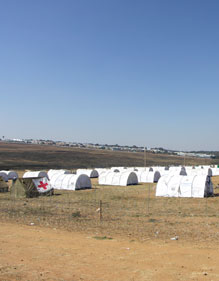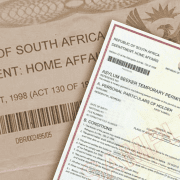|
Getting your Trinity Audio player ready...
|
 By Valencia Talane
By Valencia Talane
In May 2012 home affairs director-general Mkuseli Apleni stated in Parliament that the department had noted progress in the implementation of the Refugees Amendment Act of 2011. The focus of his presentation before the portfolio committee on home affairs was the state’s improved ability to track the records of applicants of asylum in South Africa, and better accounting for this area of the department’s work.
What Apleni conceded, however, was that there was no clear strategy for dealing with asylum applicants whose applications have been rejected by the department. Although applicants are made aware of their right to appeal a rejection, the legislation governing asylum seekers does not make provision for automatic deportation, even if their applications are rejected.
This circumstance can lead to a number of potential risks, including corruption on the one hand and the abuse of state systems on the other. Mischievous officials may use the vulnerability of asylum seekers to solicit bribes in return for speedy service or irregular documentation.
Corruption Watch has, to date, received 39 reports of alleged corruption targeted at foreign nationals seeking asylum in the country. It is most commonly perpetuated by home affairs officials, security personnel working for private companies employed by the department and even members of the South African Police Service. The number of reports may be small in the context of Corruption Watch’s database. It may also not seem voluminous in the context of the thousands of applicants who flock to refugee reception offices daily, but considering that there are fewer than 10 such offices across the country, the number is a cause for concern.
A difficult choice
A common thread among the reports is the demand for bribes – alleged by complainants – solicited by officials working for the home affairs department. Corruption Watch recently reported on the case of Kazadi Mutombo, from the Democratic Republic of Congo, whose resilient attitude against bribing for what should be a free service got him no help.
Many others who do not have the courage of Mutombo – and are genuinely in desperate need of asylum documents – succumb to the pressure they face at these centres and pay the required bribes in order to get swift service. The alternative is to walk the streets of South Africa undocumented, which in itself renders them vulnerable to arrest and deportation.
“The police officers and security guard asked me to pay R250 for me to be in the 1st ten people to extend our dayz on the asylum,” reads one report received by Corruption Watch recently. It highlights the common stakeholders in the corrupt system, including members of the police and security personnel hired to provide service on the centres’ grounds.
Other examples of reports received:
- Moses Kaunda* could not enter inside Marabastad Home Affairs for more than two weeks because he didn't have money to pay the Police officers who work at the Marabastad Home Affairs controlling the queues;
- On this day l saw two men who entered Marabastad home affairs premises illegally and they jumped over the fence, they got inside and went straight to the waiting area and security guard pretend as if he was not seeing anything but after three minutes he followed them and they give him money R100;
- Malawian nationals have been a target by the SAPS officials especially when it comes to documentation as they are asking them to speak in a local language and if these Malawian nationals fail to talk the police officers will then put them in a police van and tell that they are going to be deported;
- The SAPS officers are patrolling massively at Park Station and they are arresting foreign nationals in particular Zimbabweans who are traveling back to their respective countries. These police official are targeting those who have over stayed passports and those who don't have asylum seekers permit.
The asylum system needs changing
While she was minister of home affairs, Naledi Pandor told a media briefing at Parliament in February this year that the asylum system needs changing. She hoped that the change would come into effect in the department’s new administration since the country was heading for elections. She, too, cited this area of the department’s work as problematic, as did Apleni two years ago.
“This is an area that we don't have a proper grasp of, as the department of home affairs. It's one of the big challenges… we face as a country,” she said.
“Our law is written in such a progressive manner that you essentially cannot deny anyone the claim and temporary status of asylum-seeker, due to a number of precedent-setting rulings of our courts, as well as various clauses of the Refugees Act.
“And the reality is that economic migrants are abusing the (act) in order to have status in South Africa.”
Asylum-seekers are vulnerable
While the department directs blame at abusers of the asylum system, those who genuinely need the service may remain vulnerable without any assistance in addressing the bribery problem.
A recent report by Times Live exposed what it alleges is physical abuse by security personnel on asylum seekers at the Marabastad refugee office on World Refugee Day, 20 June. A group of foreign nationals was allegedly beaten and pepper-sprayed on the premises, prompting an investigation by the department.
Lawyers for Human Rights (LHR) director Jacob van Garderen is quoted by Times Live: "There were thousands of people there, but no toilets or shelter. People are being treated like dirt. They are being assaulted, shunted by officials and made to sit on their haunches.”
LHR has been active in the advocacy of better treatment of those seeking refugee status in the country. The organisation has been running its Refugee and Migrant Rights Programme since 1996 and is concerned that instead of getting better, the situation keeps getting worse for asylum seekers.
"In comparison to 10 years ago, things are worse. The decision-making has deteriorated. We urge the new minister to address this crisis," he said.
The LHR’s Patricia Erasmus told the SABC in an interview that although South Africa has a model system of receiving refugees, the implementation of the required practices is in an appalling state. When the department closed some of the reception offices around the country to first-time applicants, the consequence was that it overwhelmed the only three offices – Marabastad, Durban and Musina – and created a crisis for these offices.
“It is very difficult to be a refugee or asylum seeker in South Africa,” Erasmus pointed out. “Even though the policy is what we could refer to as model in theory, there are discrepancies in the realisation of refugee and asylum seekers’ rights.”
Refugees, she added, should be free to live in the community and not in camps. They should be able to access work and study opportunities as well as basic healthcare services. “Unfortunately, we see their rights not being protected due to wide scale corruption in home affairs.”
* Not his real name









